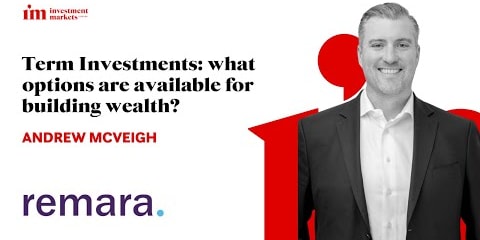When you invest in our private credit fund you not only have control and flexibility, but the choice of a secure long-term income through monthly payments or reinvestment plan.
About
In this episode of our Insights Series, Andrew McVeigh, Managing Partner at Remara, offers a deep dive into the evolving private credit landscape.
He explains how securitised credit, featuring granular, diversified loans can offer stability and consistent returns. With four tailored funds ranging from low to high risk, Remara provides options for every investor profile. Andrew highlights the structural shift in Australia’s credit market, driven by reduced bank lending and growing non-bank opportunities, making private credit a compelling long-term income strategy.
Why watch?
Investors will gain valuable insights into how private credit can deliver steady returns, reduce portfolio volatility, and align with their risk appetite, especially in today’s shifting economic environment.
Hello, I'm Darren Connolly, CEO at Investment Markets, and I'd like to welcome you to the Super Six. Six experts, six asset classes, and one outlook for your investment portfolio. Before we start, however, I need to remind you that this is all general advice and general information only, and nothing that you see or hear should be construed as an investment recommendation. You will need to decide what is right for you. With me today is our expert in private credit, Andrew McVeigh, managing partner at Remara. Welcome, Andrew.
Thanks, Darren. Thanks for having me.
Let's get started, Andrew. Our first question is private credit has been in the news lately. What have been the main themes in this asset class in the past 12 months?
Yeah, really good question. And you're right, there's been a lot of stories, probably not a lot of favorable stories around private credit in the last 12 months. And I think some of the challenges the industry has faced, particularly with real estate and real estate loans, they tend to be larger ticket sizes, larger obligors, and probably a slower moving asset class. So if you have a problem on a on a loan, your ability to be able to realize that or sell that or work through the problem generally take a little bit longer than what you find with some other alternative credit asset classes. So with that, you kind of have a few negative stories and whatnot that come through. I think my take on where we're at from a credit cycle and a credit positioning, I think Most of the real estate loans, anything coming out now is probably reset to the current market, reset post interest rate rises and kind of reset to the new environment and that's all fine. I think there's still probably a few loans that will be across the street that might be a little bit compromised and I'm pretty sure everyone's going to work through those. But on the SME side and the other forms of credit that we see and we experience, we're not seeing any substantial degradation in the underlying credit performance of Australians, particularly consumers. They are holding up really, really well. Businesses, they've gone through a rough patch, but we're not seeing anything in terms of major defaults or substantial arrears that are really going to kind of impact investor returns or impact the performance of credit.
So we're in a benign part of the cycle?
I wouldn't say benign, I probably would have said a couple of years ago we were benign. I'd say we've worked through a couple of challenges and the markets worked through a couple of challenges. And I think depending upon the type of credit that you write and the exposures that you've got, you might have a few more challenges than others. For us, we're primarily a securitized business. So 80% of what we have is securitized credit. and there's a lot more structure to that. Individual obligor sizes are very, very granular, and you're working on really well-diversified books. It's got the ability to cut out a lot of the noise. We like that asset class specifically because it is self-liquidating. It is very granular. Your risk of individual obligors is very, very small and slim, and that gives you a position that is a little bit fortified in terms of market cycles and things like that.
So you're naturally diversified through the size of the exposures?
Yeah, that's correct. We are. So we've got about 27,000 loans across our entire portfolio. And, you know, average ticket sizes can be $100,000 or less for certain asset classes that we write. We do have real estate and we do do real estate mortgages, but generally we're on the smaller size of kind of sub $10 million. We don't like to operate in the bigger ticket size. And that's because as I said before, obligor size is a larger, individual site size is a larger. If you do have a problem or you are compromised on a site, the process to work through that is a lot more complicated. And in our view, it's probably not a position where investors are really compensated for that risk if that project goes into a compromised state.
And then you end up in the front page of the papers.
Yes, which ideally we're trying to avoid.
Understood. So Andrew, what separates your approach to private credit from others in this asset class?
Yeah, look, that's a really, really good question. And it's something that we're asked a lot by wealth investors and direct investors. And I think for us, as I said, we're primarily a securitized credit house and we have a very, very unique model in terms of risk retention. So as a manager, we're actually invested into the underlying credit that we write pretty much across every single one, so all 27,000 loans. So that creates an alignment with investors in terms of outcome. We have genuine skin in the game and that risk retention layer means that we suffer first if there's challenges within that portfolio. So that means that we're very, very cautious about the credit that gets written, very specific about the industries we're going into, the sizes of credit positions that we're writing, the composition of the book overall, because essentially we're impacted first. So it's a unique model and it's something that resonates really, really well with investors once they kind of work through that and have an understanding about how we've got skin in the game and we're kind of sitting in those credit pools. We're not just earning fees and have zero outcome of the performance of the pool. We're actually sitting there with a direct line of sight and a direct economic impact if something doesn't go right.
So in effect, you're in front of the investor if something goes wrong?
Yeah. So essentially, we'll lose our money first with that risk retention layer. So it's not a sharing of the losses. It's all of our capital's wiped out before any investor suffers a loss. And that's across three of our credit funds. And that gives retail investors, particularly, a lot of coverage in terms of the performance of the book and the fact that their manager, he's invested in the performance of those assets and the economic outcome.
Andrew, how should investors think about private credit within their investment portfolio?
Yeah, so our view is there's a lot of disruption in the market. If you look at technology today, you get a lot of news, you got a lot of information, you've got to digest a lot of things really, really quickly. If you're trying to build an investment portfolio, you You kind of want to do that over the longer term. You want nice steady compounding of your return profile. And that's really what private credit does. There's a lot less noise attached to it. It doesn't have the ups and downs in the capital volatility you get with fixed income. It's generally floating in nature. And being a longer dated asset, it's got more of a compounding nature. I think what we really like about it is if you're looking at creating a portfolio where you can earn over a long period of time, a good consistent income with various degrees of risk that are up to you to select, we think credit provides a really strong alternative in that space and probably should be a foundational piece to most people's portfolio. And that's because again, you're going to open your portfolio each day and you're not going to see a 20% increase or decrease in terms of your capital value for your credit investments. Particularly, if you're in investment grade or lower risk credit, you're going to have a very, very consistent return. It's going to be a cash-based return. There's not going to be a high amount of capital volatility. You're not going to have a high amount of capital gain. If you're lucky to be caught with the Div 296, you're not actually going to have a really big impact in terms of unrealized tax or tax on unrealized gains, but not actually having the income to pay for them.
And the latest tariffs from Mr Trump won't quite have the same impact on your portfolio?
We're not anticipating that. You know, Australia's got a pretty well diverse economy now. Mining is our biggest, but it's still only 14% of GDP. And there's still a lot of growing Southeast Asian countries that need the minerals and the resources that we're exporting on a daily basis. Our expectation is that the tariffs will have a fairly minimal, if any, or probably no real impact for Australia. If it does, it might be in another year or two's time, but there's a lot of things that Trump can do between now and then.
We shall wait and see.
We will.
So you mentioned Div 296. If I'm a conservative, if I have a conservative risk profile, an investor with a conservative risk profile, what do I need to consider given my profile about this asset class? I am by nature a little bit risk averse, the benefits of the asset class you've just outlined, but what should I be thinking about?
Yeah, look that's a really good point and I think the key thing is It's actually really difficult to compare credit fund to credit fund. And I think there's a lot that is going on in market at the moment. I know that's something on ASIC's agenda to be able to ensure that there is a uniform way that people can outline and really convey the risk profiles in the underlying credit funds that are out there so they know the return profile they're getting is contrary with the risk profile they're taking. For us, given that we're securitized, what we've actually done is tranched up our fund structure to really match the different pools of capital available. If you're conservative, you should be looking for a low-risk fund. If you're wanting liquidity, you need to be asking the right questions like, how quickly can I get my money out? How liquid is the underlying asset class? And for us, given that we are securitization focused, we've got a dedicated fund, which is our investment grade fund. So that is low risk. All underlying exposures need to be investment grade rated. And essentially, that's got monthly liquidity attached to it. So that's a product that we specifically designed for investors that are seeking income and the income on that since inception is just over 8% post fees, but it is all investment grade. So you're not going to find large ticket real estate in there. You're going to find very well-structured securitized investments, public and private. But what you're going to have there is a really strong underlying credit rating investment grade as per Moody's Fitch and S&P. So the global universal measurements of investment grade credit rating. And essentially, that will give you a really good exposure to a lower risk product, where you still get your monthly liquidity.
Okay. Are there any other parameters that conservative risk profile investors should be looking at apart from those you just said?
Look, I think first mortgage investments and mortgage funds are really, again, dependent upon the structure. If it's 65% and below, then generally they'll provide a fairly strong and conservative risk approach.
65 loan to value rates?
Loan to value rates, yeah.
Okay.
They'll generally provide. The biggest challenge with those is, again, as we said before, you've got bigger obligor sizes. Liquidity may not be as free-flowing as traditional securitized, structured, or RBS or R&BS. So with that, you need to take those things into consideration. But yeah, On the whole, Australia is a very strong credit-based market. So credit as an asset class is about $3.8 trillion. We are a prime market. So what you really need to be asking is what is the underlying asset class? What is the rated securities? If it's not rated, then what is the diversification in that pool? And if you're comfortable with a low risk profile or you're seeking a low risk profile, you really need to have a good understanding about what is in the underlying funds and what you're getting exposure to. And again, if you can find rated credit, investment grade, then that's going to give you a really good idea that the underlying risk profile should be a fairly low risk profile.
And if I'm looking for something that's maybe a little bit further up the risk curve, so maybe I'm a more balanced risk profile, I'm happy to take a little bit more risk. What are the differences there for that type of investor?
Yeah. Well, similar, we've got our credit income fund, which sits behind the investment-grade funds. That's essentially a mixed pool of investment-grade and non-investment-grade. That generally yields maybe 2% or 3% more than the investment-grade funds. Liquidity in that pool is every quarter. Again, you're not as liquid because the construction of that pool is a little bit different to the investment-grade pool. a little bit less liquidity, but it is quarterly. But essentially, what you're looking for there is a good mix of some real estate, some project finance, some securitized credit, and you get a wide spectrum of credit-based assets. And that gives you a slightly better return profile than just being purely investment-grade. And as I said before, you're generally looking at 200 to 300 basis points as a potential increase over your traditional investment-grade only.
So the age old common is the higher the return, generally the higher the risk profile. So that's a good thing to look out for is what you're saying is have a look at the sort of the range and the returns and that should give you an indication.
That's definitely how we've structured our platform that we've got four credit funds. They range from kind of cash at call 48 hours notice, 5% double A or better. We've got an investment grade fund, which is roughly 8%. We've got a diversified income fund, which is around about 11% now post fees. And then we've had our credit opportunities fund, which is wholesale only, and that's around about 15% post fees since inception. So that gives you a bit of a risk scale in the natural distribution of those returns. Probably the biggest thing I'd say is the question, and again, this is one of the key things that ASIC is really honing in on, is Are the disclosed rates the right disclosed rates for the underlying risk profile and are managers ensuring that those rates are passed on? With us, we've got a full transparent platform and that's one of the reasons why we've created four different funds that go across our capital structure. So it's really, really clear and easy for investors to see where the underlying risk profiles of those pools are. And to be able to go, okay, if I'm getting 15%, it is a higher risk. But if I'm getting 5%, it is a lower risk. And then we've got mandated within that, you know, certain risk profiles from a universal measurement of risk.
So just having the little suite of products. is giving buckets for investors to look at?
It works really well. When we start to talk to investors, we're not talking to them about a specific fund. We're outlining the funds, outlining the risk profiles, and they naturally gravitate to where they feel comfortable. We're in a position, three of our funds, the three lowest risk funds are all retail-based, so we do talk to a lot of retail investors. And with our obligations in terms of design and distribution for those, We need to make sure that people really understand what funds they're coming into and what the underlying nature of that is. So a big portion of what we did was actually design a suite of funds that makes it easier or more intuitive for people to go, okay, that's a higher risk fund. I don't want to be in that. I don't naturally gravitate towards that or I'm looking for good liquidity and I'm looking for lower risk. So the investment grade fund or the term options that we've got where you can lock your money away for 12 months and you can fix that return. Again, all underlying investment-grade credit risk. It works well for investors because they naturally start to select where they feel comfortable. The good example of that is I'm at the higher risk end, my wife's at the lower risk end. But if I look at my parents, my father's at the lower risk end, my mother's at the higher risk end. You'll have couples that also have different risk profiles. That means that our platform probably appeals to a wider suite of people because you can have investors or couples that one might have one investment, the other might have a low risk investment. So there's something there for kind of everybody.
What is the outlook for private credit? What really truly excites you about this asset class?
Yeah. I think we are in a structural change in the Australian market. There's some fairly substantial tailwinds that credit have, particularly in that securitized credit. I think real estate has gone through a fairly large transition. I wouldn't say that's 100% complete, but I'd say The transition away from traditional bank finance for most projects has already happened. You've got areas such as non-bank institutions or our portfolio businesses that originate small-scale credit and use securitization is probably an area that is going to grow even further. If you look at the US-based market, 70% of credit is done by non-banks, not by banks.
And it's large in Europe as well, I believe.
In Europe, it's large. I don't think it's as large as the US, but it's certainly much larger than Australia. In Australia, I think we're roughly about 20 to almost maybe 25% now. There was a number of changes that APRA put in place for the banks in 2023, which changed risk weightings, which means banks don't want to originate as much of this credit on their balance sheet. And what they do is come back and fund businesses like ours where we'll front the customer, we'll underwrite the credit, we'll put the risk retention, we'll find investors that will sit in those structures and then the bank can still get exposure, but they still get their AAA rating and they have a lower risk rating and they get their larger ROI back on that capital. From our perspective, we see a fairly substantial shift underway. We don't see it reverting back to what it used to be. I think that's really exciting because there's a big portion of the Australian credit market that hasn't really been addressed yet. And there's further growth opportunities around this. And securitized credit, it's a higher bar to entry. Like it's very, very technical in terms of the structures. The ability to originate small-scale credit is particularly difficult. So you've got to have well-established businesses that have been doing it now for a while. You've got to go through market cycles. like we just have through COVID and rapid interest rate rises and ATO foreclosures and so forth. So you got to have a lot of that experience. And we've now built our platform over the last seven years where we've kind of experienced almost every single thing you can experience. And that puts us in pretty good stead. And then what you've got through securitized credit, which again, we like a lot, is that risk retention model where that is actually mandated in the structure. So you've got third party trustees that are looking over the performance of the pool. They're doing the waterfall cash flow testing. So they're kind of paying out to all the investors. It's all segregated lockbox. There's backup services. So if anything happens, there's someone who could step in and collect all the contracts and so forth. So there's a lot of structure and a lot of institutional governance in and around. And that means it's a good strong investment for all investors. And it's the actual underlying contract type and structure that actually fits into most fixed income bonds. Just the difference is these are private investments, so they're not publicly traded or they're not as actively traded. So as a result of that, they don't move around as much in there, as I said before, generally floating in nature. you don't have the large capital volatility moves from RBA changes.
It sounds like the asset class has got a lot of strategic tailwinds sitting in behind it.
I think it does. If you look at the Australian economy, we're still a fairly young economy. We have a very substantial pension system that is growing. You've got a lot of natural wealth that is growing. Essentially, private credit, as I said before, is a very patient asset class. It gets rid of the distraction. It gets rid of the noise. The conversations we're starting to have with investors, their eyes are being opened to a new form of income generation that they haven't had access to in the past. That's exciting for them because they're finding new ways to invest and new opportunities. That's probably what we're seeing. We think that trend will continue and we think it will actually just grow as time goes past.
Well, the demographic bulge of baby boomers and even the generations following them are certainly all going to be looking for income substitutes. And it sounds like this private credit is well placed to meet some of those requirements.
I think it is. Yeah, I think it is. I think the other thing I would say is just make sure you understand what you're investing into and if the return is high, there's a reason why it's high.
Thank you for watching. For more insights from the Super 6 and to search, find, and compare hundreds of investment products all in the one place for free, go to investmentmarkets.com.au.
Meet the speakers


Related Investments
A high-yield, open ended fund offering monthly distributions, quarterly redemptions and a highly diverse pool of credit loans which are secured by real assets and structural protections. (For Wholesale Investors Only)
Are you looking for a safe and rewarding place to invest your money?






